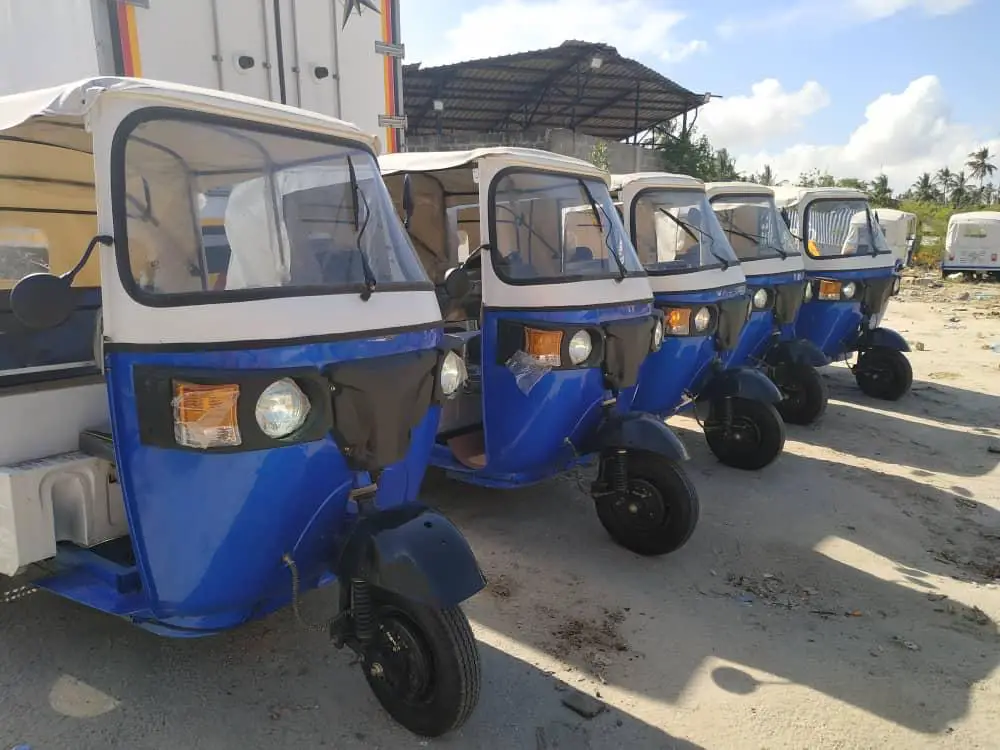- Tanzania-based clean energy company, TRí, is introducing electric tricycles to the country’s transportation sector to reduce carbon emissions.
- On average, the oil-powered motorcycle is estimated to be 10 times more polluting per mile than a passenger car, light truck, or SUV.
- The move to roll out electric motorcycles aligns with Tanzania’s Inclusive Green Economy (IGE) Program, which aims to promote zero emissions by 2030.
The transport industry accounts for a significant amount of carbon emissions in Tanzania and around the world. Through players in the private sector, Tanzania is turning the tide with green transport startup, TRí, launching electrical tricycles in the market.
These tricycles promise cost savings for thousands of riders, especially small-scale traders who dominate the country’s transport industry.
With the rising cost of fuel, electric tricycles are becoming the go-to option for traders who are keen on protecting their margins, with TRí’s market survey showing that their incomes are doubling.
Established in 2020, TRí specializes in designing and operating electric vehicles, and battery energy storage for homes, as well as providing related green transport products and services, initiatives that are opening up job opportunities for the youth in Tanzania.
At the moment, TRí is operating an assembly plant in Tanzania, significantly shielding itself from supply chain disruptions witnessed during the depths of the Covid-19 pandemic when manufacturers struggled to obtain supplies from distant manufacturing hubs, such as China.
“Our mission at TRí is to power people and organizations sustainably. We do so by offering mobility and energy solutions that are affordable, reliable, sustainable, and tailored to meet their unique needs,” said Niko Kadjaia, co-founder and CEO of TRí in an exclusive interview with The Exchange.
“Transportation and energy play a crucial part in economic development. As an e-mobility company, we’re positioned at the convergence of the two. This puts us in a great position to accelerate inclusive and sustainable economic development in the markets we operate in.
TRí is a customer-first company. Our core focus is to create tangible value for our customers. We achieve this by being part of the communities we operate in. The communication between our customers and TRí is fluent, allowing us to build products and services that people care about.”
Niko added that the company is continuously seeking ways to improve and stay ahead of the curve in a rapidly changing transportation industry in Tanzania.
“TRí is being built with an ethos of continuous improvement and scalable innovation. These pillars are central to fulfilling our promise to our customers: We’re dedicated to maximizing the value created for them.”
Tanzania’s TRí electrical tricycles scheme driving green economy
TRí is pioneering green vehicle accessibility with its Lease-to-Own program, assisting those without initial capital by enabling vehicle ownership through a daily fee. The company also offers vehicles for outright purchase at $3,404 (TSH8.6 million), an offering designed to reduce operating costs by up to 90 per cent.
These vehicles feature a quick 2.5-hour charge, costing $1 (TSH2,520), enough to provide users with a 100-kilometer transportation range. Enhancing its product stable, TRí is launching the E2 model in March 2024.
The new model offers the same savings but increases the transportation range to 115 kilometers per charge. Through these initiatives, TRí is steadfastly dedicated to providing economical and efficient vehicle solutions.
“We are actively pursuing partnerships with various banks, and I’m pleased to announce that we have successfully forged collaborations with Equity Bank and Mwanga Hakika Bank,” explained the CEO.
“These partnerships offer drivers the opportunity to access credit financing, with Equity Bank requiring a modest starting deposit of 1.9 million shillings and Mwanga Hakika Bank requiring only $2,058 (TSH5.2 million) as an initial investment,” he said.
Summing up, he pointed out that; “These favorable terms have empowered business owners to expedite their vehicle acquisitions. Furthermore, we are building a distribution network to further our sales through various closed deals with distributors, retailers, and agents.”
Read also: Kenya’s bold move to foster growth through the circular economy
Tanzania’s path to green transport
Tanzania has established a green revolution agenda for 2030, themed ‘leave no one behind,’ aiming for a transformation towards an inclusive green economy. To achieve Agenda 2030, the country is implementing the Inclusive Green Economy (IGE) Program, among other initiatives.
This program, financed by the Swedish International Development Cooperation Agency (SIDA), is carried out by the University of Gothenburg and the Environment for Development Initiative (EfD), in collaboration with academic centers in the five East African countries.
While IGE is a national initiative led by the government, the private sector in Tanzania is also at the forefront of the desired green revolution, offering innovative solutions to shift everyday activities and production methods from the use of fossil fuels to green and sustainable energy sources.
The transportation sector plays a crucial role in achieving this ambition. Tanzania, like many third-world countries, heavily relies on motorbikes and tricycles for public transport in both cities and rural villages.
Motorcycles and tricycles are favored for their cost-effectiveness and efficiency compared to private cars and public buses.
In Tanzania, for instance, the World Health Organization (WHO) estimated that as of 2016, there were over 1,280,000 registered motorcycles and three-wheelers.
It is further estimated that over 150,000 new motorbikes and tricycles are registered in Tanzania annually. This substantial number of vehicles translates to significant emissions of carbon and other greenhouse gases.
“The average motorcycle is estimated to be 10 times more polluting per mile than a passenger car, light truck, or SUV. Hydrocarbons are dangerous to human health,” noted Prof. Peter Anyang’ Nyong’o, Governor of Kisumu County during Kenya’s launch of electric motorcycles.”
Kenya’s pilot electric motorcycles program
In 2021, the UN Environment Programme (UNEP) in Kenya launched a pilot electric bike project. The initiative was implemented across four locations with the aim of reducing air pollution, enhancing national energy security, and creating green jobs.
“Kenya is importing more motorcycles than cars, doubling its fleet every 7-8 years. These motorcycles are generally inefficient and poorly maintained, contributing to pollution,” said Joyce Msuya, UNEP Deputy Executive Director.
“Kenya’s electricity was very green in 2019, with more than 80 per cent generated by hydro, solar, geothermal, and wind. Shifting to electric bikes in Kenya, Rwanda, Uganda, and elsewhere will reduce costs, air pollution, and greenhouse gas emissions, as well as create jobs.”
“Electric motorcycles not only mitigate against this health hazard but also help reduce noise pollution caused by the rampant increase of petroleum-powered motorbikes in our cities,” noted Prof. Nyong’o.











